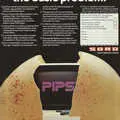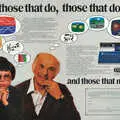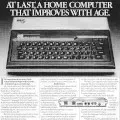Sord/CGL Advert - 23rd June 1983
From Personal Computer News
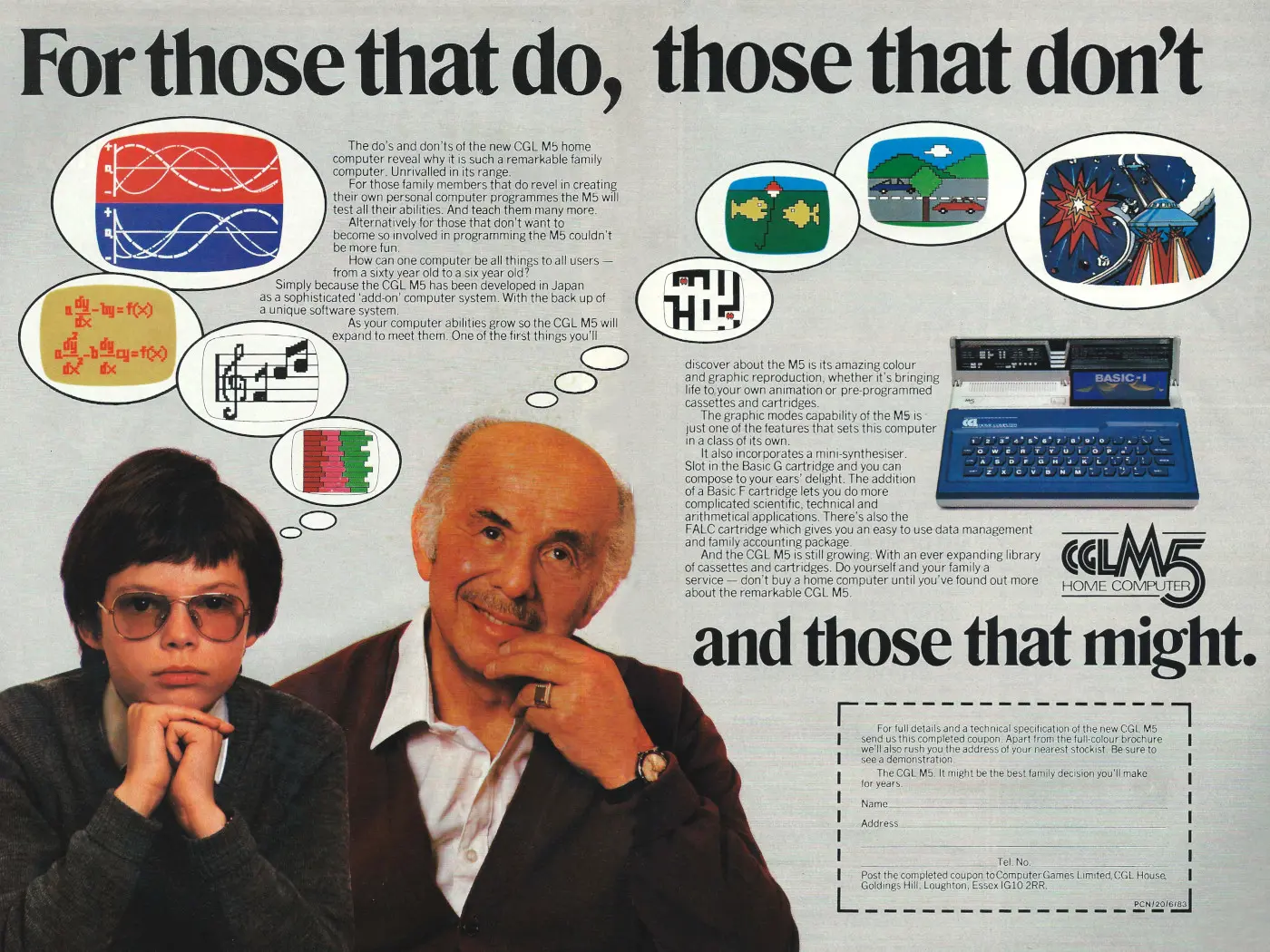
For those that do, those that don't and those that might
The Japanese Sord M5, launched in October 1982 at the Tokyo Data Show[1], was one of a handful of computers - a group which included the Sinclair ZX Spectrum and Jupiter Ace - that decided not to provide a standard space bar, instead choosing to offer "space" as a regular function key much the same size as the shift and enter keys, between which it is positioned.
It was distributed in the UK by Computer Games Limited - a company known for its Game & Match toys - as the CGL M5.
Echoing 1979's Transam Triton, it had different versions of BASIC available for it, which in the Sord's case were available as plug-in cartridges rather than pre-installed in ROM.
These were an integer-only variant called BASIC-I, a graphics-heavy version called BASIC-G and a fully-fledged floating-point version aimed at "Scientific, technological and statistical computing" called BASIC-F.
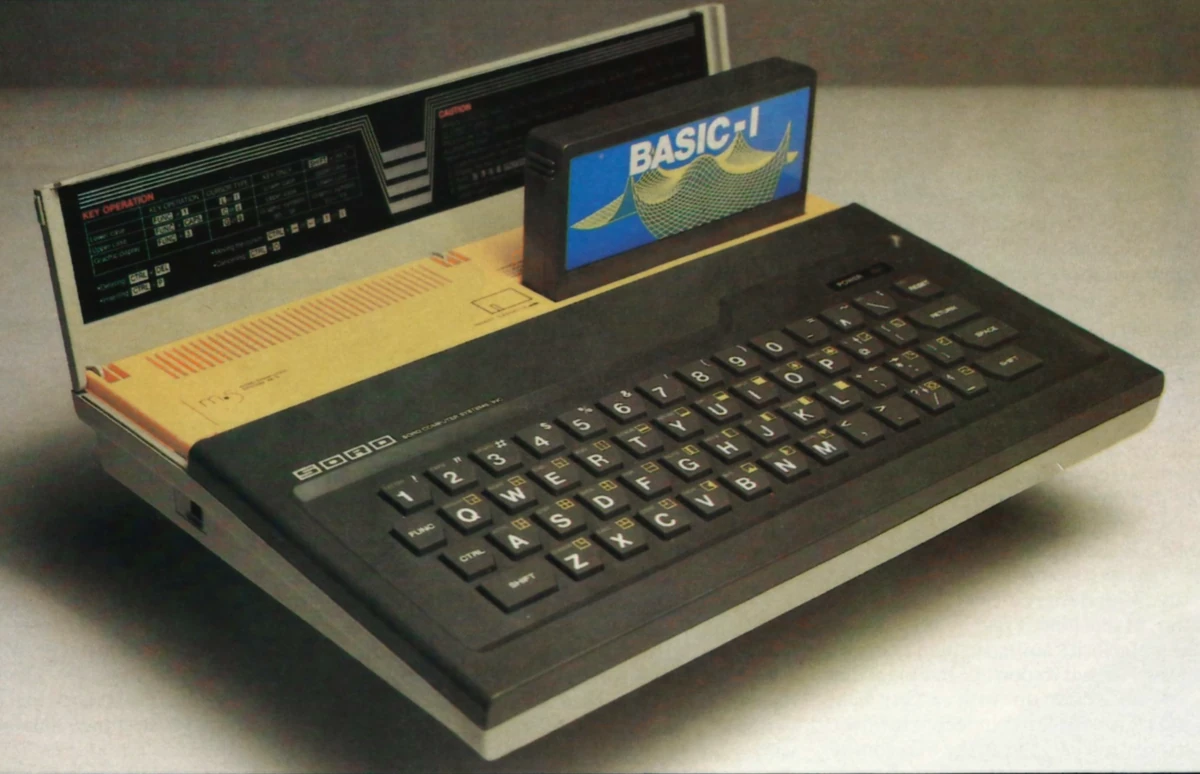
A Sord M5 with a BASIC-I module plugged in. From Personal Computer World, August 1983
It ran a 4MHz Zilog Z80A which, combined with its other specs, including the same sound chip as the BBC Micro and an MSX-identical video chip[2], made it similar to other pure-MSX machines available at around the same time, like Toshiba and Mitsubishi's models.
It retailed for £195 - about £850 in 2026 money - for the version that you could actually do something with, although there was a cheaper model at £150 with only 4K of free RAM - about the same as the VIC-20 from two years before.
The M5 didn't do that well. Its price put it in what was called at the time "the ferocious under-£200 market"[3] but it was more expensive than its contemporaries like the Sinclair ZX Spectrum or Commodore's 64 - both of which were well-established and had thousands of software titles behind them.
It also seemed to suffer from poor documentation, with Popular Computing Weekly suggesting in its review that owners should get hold of a Memotech manual as that "contains all they should need".
Lack of detailed technical information could affect the ability of third parties to write software if information on system variables and the machine's memory map was hard to come by - a problem which contributed to the downfall of Texas Instruments' TI-99/4 and which also affected Atari, which chose to restrict "secret" system information to only developers who would sign a non-disclosure agreement.
Unsurprisingly, most of those developers all buggered off to write for someone else's machine instead.
The lack of documentation - as well as the relatively high price - was raised in a review of the machine in August 1983's Personal Computer World, which concluded:
"The Sord M5 is not a cheap computer and is impeded by a somewhat limited memory. It is bound to suffer in comparison with machines like the Spectrum and Oric, both of which offer 48K at a considerably cheaper price. That said, it must be admitted that the M5 makes graphics programming extremely simple and allows some stunning effects to be achieved with the minimum of fuss. It will therefore appeal to the games programmer - although the lack of information about memory addresses is something that needs to be rectified to attract the machine-code fanatic. The M5 is beautifully designed and constructed; it definitely has the air of a quality machine. If Sord would only include BASIC-G in the package and knock fifty quid off the retail price, the M5 could well be a winner[4]".
Despite these issues, Sord's parent company - founded in Japan in 1970 by Takayoshi Shiina - survived and was eventually bought out by Toshiba in 1999[5], which had acquired a 38% stake in the company in March 1985[6].
Date created: 24 January 2024
Last updated: 15 January 2026
Hint: use left and right cursor keys to navigate between adverts.
Sources
Text and otherwise-uncredited photos © nosher.net 2026. Dollar/GBP conversions, where used, assume $1.50 to £1. "Now" prices are calculated dynamically using average RPI per year.
